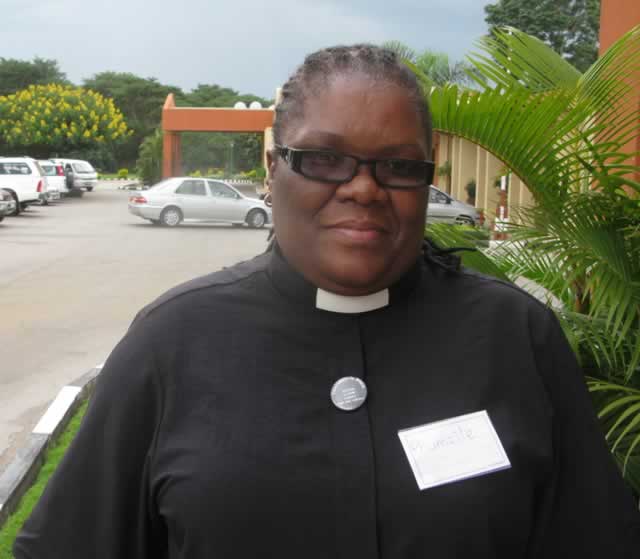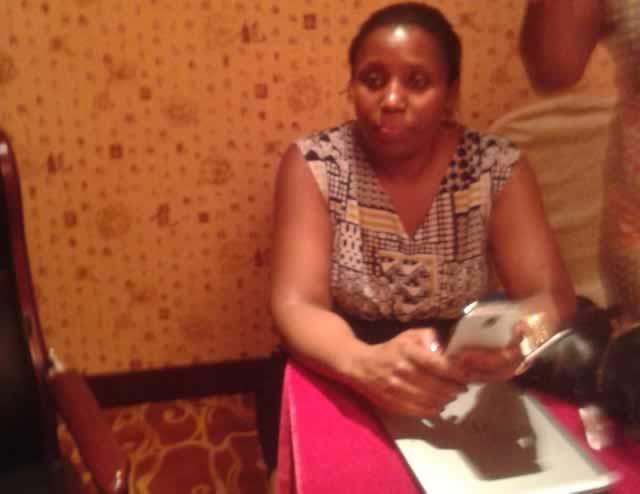Determination goes beyond HIV story
message was that ‘you are HIV positive, go home and wait for your time’ which was scaring,” said Dick.
Dick, who walks using a stick after losing his sight in 2008, said he can go national with his story as long it would save some lives.
He said after testing HIV positive his wife died the following year in 2001. Despite losing his wife he said he still convinced himself that he was okay. Dick said he went on to co-habit with a woman in 2003 and in 2005 he developed a severe patch of herpes.
“In 2005 I got so ill. I had a bad patch of herpes that left me bed-ridden for sometime. I had the will to live but unfortunately the woman I lived with deserted me. I nursed myself to better health and when I was able to move around I decided that it was time to move on,” he said.
Dick said with the economy playing haywire on most people he tracked to neighbouring Botswana where he got a job as a truck driver.
“I went to Botswana in 2006 and was lucky to get a job immediately. I worked for a delivery business and plied between Gaborone and Francistown.
I had a terrible headache one day in 2007 on my way to Francistown. I bought some tablets from a chemist. The headache calmed and I continued with my journey to Francistown,” he said.
He said when he got home the headache recurred and this time around it was splitting.
“In the evening I felt so dizzy. I had a splitting headache and was taken to hospital by friends. There I was treated overnight and the following morning was asked to take an HIV test. As someone who knew his status I did not refuse and was not surprised when I was told that I was HIV positive. The problem now was that I had meningitis,” said Dick.
Dick said he was offered the opportunity to begin ART in Botswana or transfer to his home country. He opted for the latter.
“I was asked if I wanted to commence ART in Botswana or come back to Zimbabwe. I chose to come back home and I was on my way to Harare as soon as I felt better,” said Dick.
Dick added that by the time he arrived in Harare he was frail and went straight to Parirenyatwa Hospital where he was admitted.
“I was admitted at Parirenyatwa Hospital sometime in May 2007 and was not fit by the time I was discharged in August the same year. I was taken in at Mashambanzou care home in Waterfalls where I stayed until January 2008.
“My health had improved by January 2 since I was on ART. I was discharged from Mashambanzou and went straight to my rural home,” he added.
He said: “Life was not easy back home in Domboshava. My relatives were just waiting for the day because they did not believe that I was healed. People who came to see me would even whisper that I was a moving grave (guva zvaro). “Despite all this talk, I was determined to live, I even told some of them that I would be the one to bury them because they did not know their HIV status,” he added.
Dick said that one afternoon when he was having lunch he felt a hazy blanket cover his eyes and enquired if anyone was burning some rubbish. He said it is at that moment that he lost his sight.
“Infact I was asked why I was letting chickens eat from my plates. I told them that I did not see any chickens and on waving my hand I chased the chickens away.
“That is when I realised that I could no longer see. I was taken to Parirenyatwa Hospital the next day where I was informed that meningitis that I had ‘nursed’ over years had affected my nerves and I had lost sight. They said it was irreversible,” he added.
Dick said he continued with ART and had no side effects since then.
He said three of his friends from Harare heard of his predicament and visited him.
“My three friends from Harare heard that I was now blind and visited me. Although I was not able to see, I could feel that one of them was not well, he kept clearing his throat.
“I told him to get tested for TB and also advised all three to know their HIV status and they laughed.
“They told me that it is sad that I could no longer see and was unable to go drinking with them,” added Dick.
Dick assured the three that he was on the path to recovery and he was worried about them as they did not know their HIV status.
“I told them that I would bury them. Infact I told them that I would ‘see’ them meet their maker one by one and this happened,” he said.
Dick said that the one who kept clearing his throat died from TB and it was too late when the HIV co-infection was diagnosed.
“He was in denial, he did not like visiting the clinic, infact he was taken to hospital when he was unconscious and by then the tests showed TB-HIV co-infection. The health staff could not save him, he joined his ancestors,” he said.
Dick said that he thought that the passing on of one of the trio would send a signal for the others to get tested but nay, they did not.
“I was later told that the second friend had a terrible headache for two weeks and he died. He died from cryptococcal meningitis,” he said.
The third friend did not wise up. He too left it until it was too late and he again died from cyptococcal meningitis.
“Meningitis is wiping people living with HIV like a veldfire. I do not know why people still live in denial in this age and time,” asked Dick.
Dick urges everyone to get tested this year. He said gone are the days when people shared medication at home and self diagnosed.
“Gone are the days when people shared medicine. Everyone must know his/her HIV status and so that there will be no medicine sharing at home,” said the jovial Dick.
Dick is a member of Yamurai Support Group that operates from Dzivaresekwa Extension in Harare. He moves around with the group sensitising the community on the need to get tested for HIV.
For him losing sight has not been a hindrance. Infact it has made him grow the undiscovered person in him. He now enjoys working in the garden and even sells surplus vegetables.
Mrs Benneta Jabangwe, who is the Programme Officer, Information, Advocacy and Gender with The Centre said working with Yamurai has been a pleasure.
“We have been partners and have worked with Yamurai for the past four years. Whatever you teach them is mastered and there is no going back. We have assisted them with setting up a nutrition garden and I am proud to say that they do not have a dependency syndrome, what’s learnt is used. That is the pleasure of working with Yamurai,” said Mrs Jabangwe.
The Centre, founded by Lynde Francis who passed away in March 2009, has continued with the work left.
Today The Centre works with various groups dealing with health and HIV issues. Yamurai is just one of them.
A doctor speaking on condition of anonymity said deaths from cryptococcal meningitis are on the rise yet this could be avoided.
“Its not that the medical personnel are no longer able to treat this type of meningitis. The patients report late after having nursed a headache for weeks. The virus would have cause irreparable damage to the nerves,” he said.
“Cryptococcal meningitis is not very common. It is rare in people with CD4 counts above 100, more often occurring when CD4 counts falls below 50. It does also occur, though rarely, in people who are otherwise healthy and not living with HIV,” he added.
It’s high time people stopped nursing illnesses at home. That nagging headache may be meningitis.
By the time you report at the clinic or see your doctor after self-treatment at home for weeks, the virus would have spread and caused irreparable damage.
There is no need to lose your sight over something that can be contained. If you are experiencing confusion, disorientation, severe headache or seizures, you should contact a health provider immediately.
I hope you had a blessed Easter and if travelling, be safe.







Comments